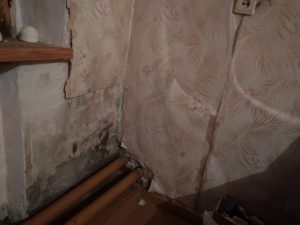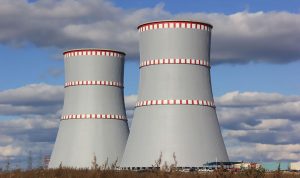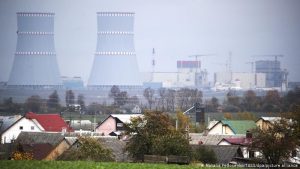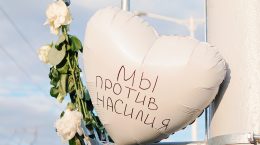Thirty-five years ago, there was an accident at the Chernobyl nuclear power plant. As a result, 55 regions of Belarus suffered from radiation. Twenty-three percent of the territory of Belarus was contaminated with cesium-137, its maximum level was recorded in the Bragin and Cherikov regions. Many people have been resettled; many more have suffered from radiation-induced illnesses. That is why the construction of BelNPP on the territory of our country was perceived negatively. And ICCI “Nash Dom” began to fight against the station.
Let us recall the chronicle of the tragedy. At 1.23 a.m. on 26 April 1986, while unsuspecting people were sleeping in their homes, the fourth unit of the Chernobyl nuclear power plant exploded. 300 times more radiation was released into the environment than during the bombing of Hiroshima. More than 70 percent of radionuclides settled on the territory of Belarus.
 The Soviet authorities decided to keep silent about the disaster that had happened and the danger of radiation. For several more days, people from Pripyat calmly walked around the city, and firefighters worked to extinguish the power unit without protective suits, which is why they later died in terrible agony from radiation sickness. On 1 May, outdoor demonstrations took place across the country. And only then did people learn about the disaster, and the evacuation of residents of the affected territories began. Instead of providing people with quality medical care, the Soviet Union spread myths about the benefits of milk from radiation, which only exacerbated the condition of the sick.
The Soviet authorities decided to keep silent about the disaster that had happened and the danger of radiation. For several more days, people from Pripyat calmly walked around the city, and firefighters worked to extinguish the power unit without protective suits, which is why they later died in terrible agony from radiation sickness. On 1 May, outdoor demonstrations took place across the country. And only then did people learn about the disaster, and the evacuation of residents of the affected territories began. Instead of providing people with quality medical care, the Soviet Union spread myths about the benefits of milk from radiation, which only exacerbated the condition of the sick.
Throughout the years of its activity, “Nash Dom” has covered topics related to the disaster. Activists travelled to Chernobyl-affected areas, sharing what lives in the countryside are like and fighting for the rights of people whose lives have been affected by the accident. Finally, it was the human rights activist of “Nash Dom”, Valery Shchukin, who founded the Chernobyl Way.
In 2011, the project “Dom-show” was released on the YouTube channel “Nash Dom TV”. In its second edition, it brought together a staunch opponent of BelNPP construction, Nikolai Ulasevich, and human rights activist Nikolai Petrushenko, an equally staunch advocate of nuclear power plant construction. Nikolai Ulasevich shared his opinion that there is no ecological or economic benefit in the construction of the station. Nikolai Petrushenko recalled the authorities’ outrageous statements about highly enriched uranium.[1]
In 2012, the activists of the campaign “Deputies – to account!” together with representatives of the movement “Chernobyl – Belarus Union” walked through the Zhodino market in search of products contaminated with radionuclides.[2] In 2013, Olga Karach, leader of the “Nash Dom” Civil Campaign, and Alexander Volchanin, Chairman of the “Chernobyl-Belarus Union” Public Association, met. Initiatives agreed to cooperate. The leader of the “Chernobyl – Belarus Union” said that this interaction could become an example for other opposition organizations.[3]
In the same year, the Belarusian organization “Association for Modernization in the Czech Republic” and the Civil Campaign “Nash Dom” organized an exhibition “The Chernobyl Tragedy” in Prague. The photographs in the exhibition created an atmosphere in which every viewer could understand, at least a little, the feelings of people who survived the tragedy. The exposition demonstrated the cultural aspect, the aspect of common human memory, in order to avoid repeating such mistakes in the future.[4]
 In 2017, activists from “Nash Dom” visited a hostel located on Rokossovsky Street in Slagorod, which was in the Chernobyl zone. The tenants were paying quite high prices for utilities, yet the building was in need of major repairs and the living conditions left a lot to be desired. For example, there was only one bathroom, and only with cold water, peeling wallpaper, the smell of dampness and mold, fungus. Anzhelika Kalatozishvili, a wheelchair invalid of the 1st group, lived in one of the rooms. In 2018, just a couple of months after the activists’ visit, renovations began in the hostel.[5]
In 2017, activists from “Nash Dom” visited a hostel located on Rokossovsky Street in Slagorod, which was in the Chernobyl zone. The tenants were paying quite high prices for utilities, yet the building was in need of major repairs and the living conditions left a lot to be desired. For example, there was only one bathroom, and only with cold water, peeling wallpaper, the smell of dampness and mold, fungus. Anzhelika Kalatozishvili, a wheelchair invalid of the 1st group, lived in one of the rooms. In 2018, just a couple of months after the activists’ visit, renovations began in the hostel.[5]
After so many troubles and destruction from Chernobyl, it became important to prevent a repeat of these events. That is why “Nash Dom” has been against the construction of the BelNPP since 2012-2013. In 2017, activists spoke out against the silence of problems at the station at the OSCE Parliamentary Assembly. In 2019, we took part in a meeting to discuss the Environmental Report on Strategic Environmental Assessment of the draft Spent Nuclear Fuel Management Strategy. In 2020, shortly before the planned launch date of the BelNPP, a description of the “STOP NPP” campaign appeared on the website of the ICCI “Nash Dom”. The activists have made it their aim to avoid a repeat of the Chernobyl story and to prevent a new tragedy. “Nash Dom” highlighted a number of problems at nuclear power plants in the field of safety, economics, ecology, human rights, national security and international organizations.
 Thus, the activists emphasized that the BelNPP lacks not only strategies, but also safe solutions for the management of spent fuel, the project does not have a station site for dry storage of spent nuclear fuel, and an agreement on its reprocessing has not been concluded between Belarus and Russia. In addition, after the European audit and public examination of stress tests at nuclear power plants, safety problems were identified, including the lack of evidence of equipment seismic resistance, functionality of passive and active safety systems of the project. The reactor facility was not sufficiently developed in practice, the NPP design did not comply with modern approaches to safety and recommendations of the IAEA and WENRA. During the construction of the station, a number of incidents occurred, which also reduced the reliability of the operation.
Thus, the activists emphasized that the BelNPP lacks not only strategies, but also safe solutions for the management of spent fuel, the project does not have a station site for dry storage of spent nuclear fuel, and an agreement on its reprocessing has not been concluded between Belarus and Russia. In addition, after the European audit and public examination of stress tests at nuclear power plants, safety problems were identified, including the lack of evidence of equipment seismic resistance, functionality of passive and active safety systems of the project. The reactor facility was not sufficiently developed in practice, the NPP design did not comply with modern approaches to safety and recommendations of the IAEA and WENRA. During the construction of the station, a number of incidents occurred, which also reduced the reliability of the operation.
In the field of economics, the absence of public and relevant data on the economic feasibility of the Ostrovets NPP, the lack of demand for additional power generation, the absence of large industrial consumers of the plant’s energy, the lack of sufficient reserve capacity, and the irrationality of construction were found. The negative impact of the BelNPP on the development of sustainable energy and energy conservation has been proven; it also increases the external debt of Belarus.
 Ostrovets NPP, according to the facts of “Nash Dom”, has a negative impact on the microclimate and preservation of cultural heritage sites, on specially protected natural areas and representatives of the Red Book of fauna. BelNPP irrationally uses the resources of the Viliya River and creates risks in the context of global climate change. NPP emissions increase the radiation load on nature and people who have already suffered from the Chernobyl accident.
Ostrovets NPP, according to the facts of “Nash Dom”, has a negative impact on the microclimate and preservation of cultural heritage sites, on specially protected natural areas and representatives of the Red Book of fauna. BelNPP irrationally uses the resources of the Viliya River and creates risks in the context of global climate change. NPP emissions increase the radiation load on nature and people who have already suffered from the Chernobyl accident.
The construction of a nuclear power plant increases the multifactorial dependence of Belarus on the Russian Federation, and influences “deeper integration” with Russia. This is a source of cross-border disputes with neighboring countries (for example, Lithuania) and a source of violations of the rules of international organizations, including the UN, and human rights.
We believe that the launch of a nuclear power plant creates unacceptable risks for the people and nature of Belarus, the affected countries, as well as for the economic and financial stability of Belarus. This threatens national independence and the country’s sovereignty. We appeal to the decision-making bodies and organizations, the citizens of Belarus with an appeal to postpone the launch of the BelNPP until all problems are resolved, to hold consultations on the advisability of continuing the moratorium on the construction of a nuclear power plant in Belarus, as not meeting the interests of the country, to develop and discuss with the public the strategy of sustainable nuclear-free development of Belarus. And we add that the Russian nuclear power plant on the Belarusian territory can become an instrument of hybrid war.[6]
According to the latest data, the launch of the BelNPP was postponed until 2022. This means that we have time to avoid the high costs of handling spent nuclear fuel, hazardous for millennia, and unacceptable environmental risks. After all, the authorities are now much more important to stop large-scale protests and provide salaries for riot police than to take care of the security of Belarus and neighboring countries.
[3]https://nash-dom.info/18218
[4]https://nash-dom.info/16885







